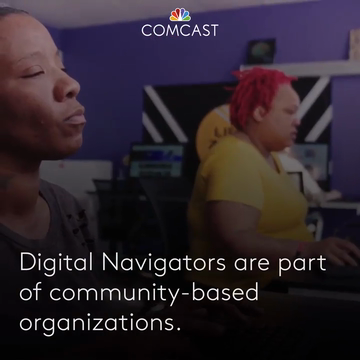Digital Navigators: Keys to Getting Our Communities Digitally Connected
By Dalila Wilson-Scott
Right now, 50 percent of families in lower income brackets lack access to the technology required for online education. By 2030, an estimated 9 out of 10 jobs will require digital skills – but nearly one-third of U.S. workers lack these skills. If current trends continue, people of color could be under- or unprepared for up to 90 percent of all jobs by 2045.
At Comcast, we see these challenges and know we are uniquely positioned to help solve them. One of the most effective ways we’re doing so is through direct involvement and investment in local communities and partners nationwide who are on the frontlines of change. When it comes to closing the digital divide, digital navigators are among the most essential change agents.
Digital navigators help community members understand how important digital skills are, and how to access available resources. They are the local voices community members know and trust most.
What is a Digital Navigator?
A Digital Navigator helps people get online and make the most of it.
They can help someone:
- Sign up for Internet service
- Get a device
- Connect to skills training and other resources
Digital Navigators are part of community-based organizations. They’re a trusted voice for those who don’t know where to start. They help open the door to opportunity and economic mobility.
Of people who’ve received help from Digital Navigators:
- 1 in 3 found a new job or increased their income
- 40% received support with basic needs like food, rent, and housing
A recent Boston Consulting Group (BCG) study found that when individuals worked with digital navigators, more than 85 percent connected to the Internet at home more frequently, and 1 in 3 found a new job or secured a higher income. Nearly three quarters (72 percent) of Black and Hispanic individuals surveyed obtained Internet access or a home computer or tablet with the help of a digital navigator. Nearly half of all those surveyed obtained better healthcare and 40 percent were able to access support for basic needs like food, rent, and housing because of their work with digital navigators. Quite simply, digital navigators help change lives.
That’s why they are an essential part of Project UP, our 10-year, $1 billion pledge to advance digital equity through programs and community partnerships that connect people to the Internet, advance economic mobility, and open doors for the next generation of innovators, entrepreneurs, storytellers and creators.
Although proven effective at helping to remove adoption barriers and advance trust, digital navigator programs often remain underfunded. Through Project UP, we’re intentionally investing directly in community-based initiatives and programs to broaden the scope of digital equity organizations in communities by training and deploying more digital navigators in cities and states across the country.
Earlier this month, I traveled to Massachusetts to announce our latest investment of $500,000 in 17 organizations supporting digital access and adoption for residents across the Greater Boston region. Among the grant recipients are Central Boston Elder Services, which provides services to elderly and disabled people and caregivers; One Bead, an organization dedicated to closing the opportunity group through high-impact entrepreneurial programming for students; and Tech Goes Home, whose work brings computers, internet, and training to families and individuals throughout Massachusetts.
Tech Goes Home has a team of more than 300 active instructors supporting community members, or learners, in understanding the importance of digital skills and how to access available resources. Together, they’ve helped thousands of people in the Boston area get connected.
Yoscairy Raymond, one of Tech Goes Home’s digital navigators, shared with us the difference their work is making in the community.
“It’s really great to connect the families that we work with in the community. A lot of the families don’t have that access to the internet or that access to computers. Being able to bridge that gap and see the smiles on their faces when they can do a PowerPoint or send an email ─ it’s been really rewarding. Seeing how that has actually opened opportunities for them to get jobs, apply for apartments or even other government assistance has been so rewarding. To think that this one small step, maybe to some people, is actually a huge open door for a lot of our families.”
As we made these latest grant announcements, surrounded by local leaders who are doing the important work of helping to improve access and opportunity in their communities, I was filled with great optimism for what lies ahead ─ for the countless tangible ways we will help change lives by investing in and working with our digital navigation partners. Story by story, community by community, we are laying the foundation for an incredible future of unlimited possibilities.
Dalila Wilson-Scott is Executive Vice President and Chief Diversity Officer for Comcast Corporation and President of the Comcast NBCUniversal Foundation.







